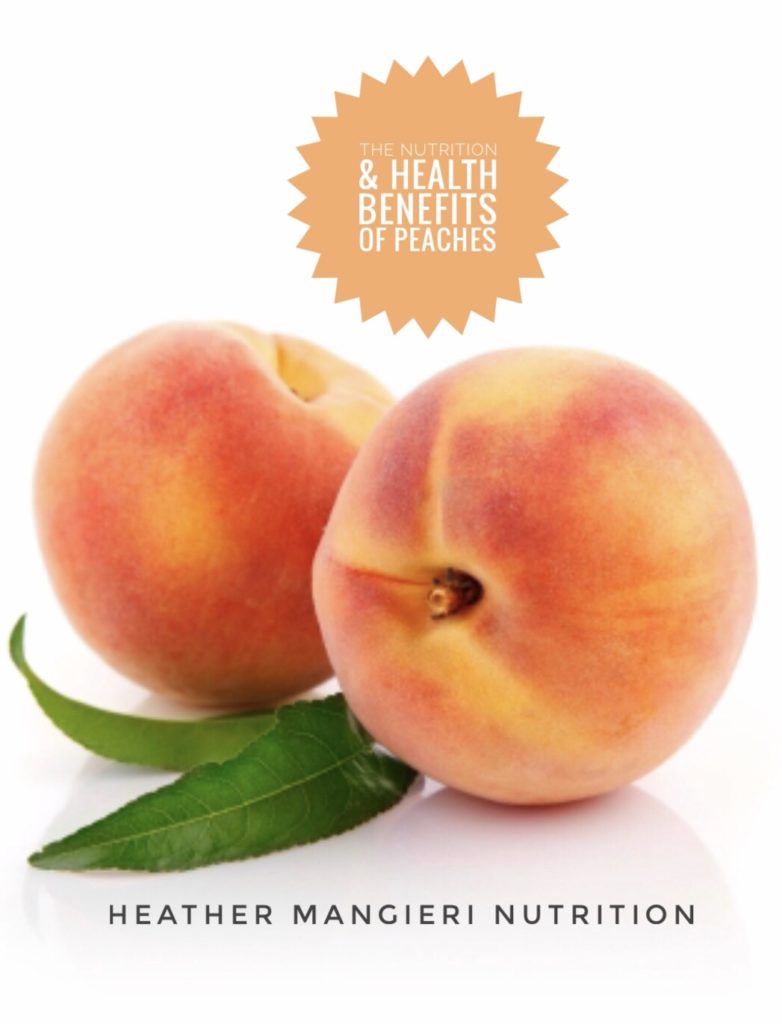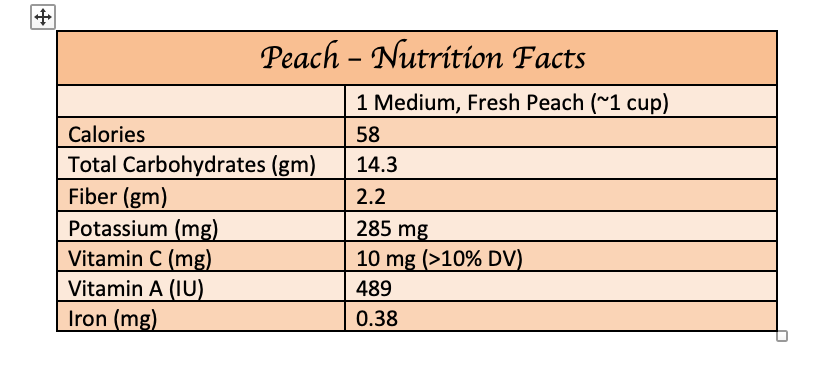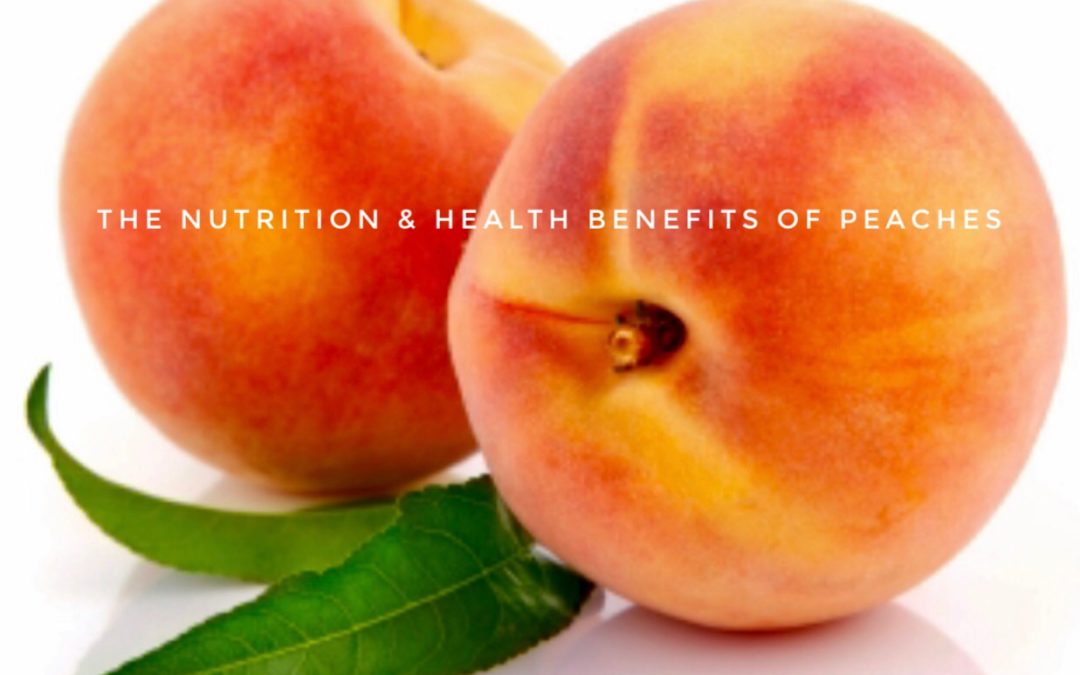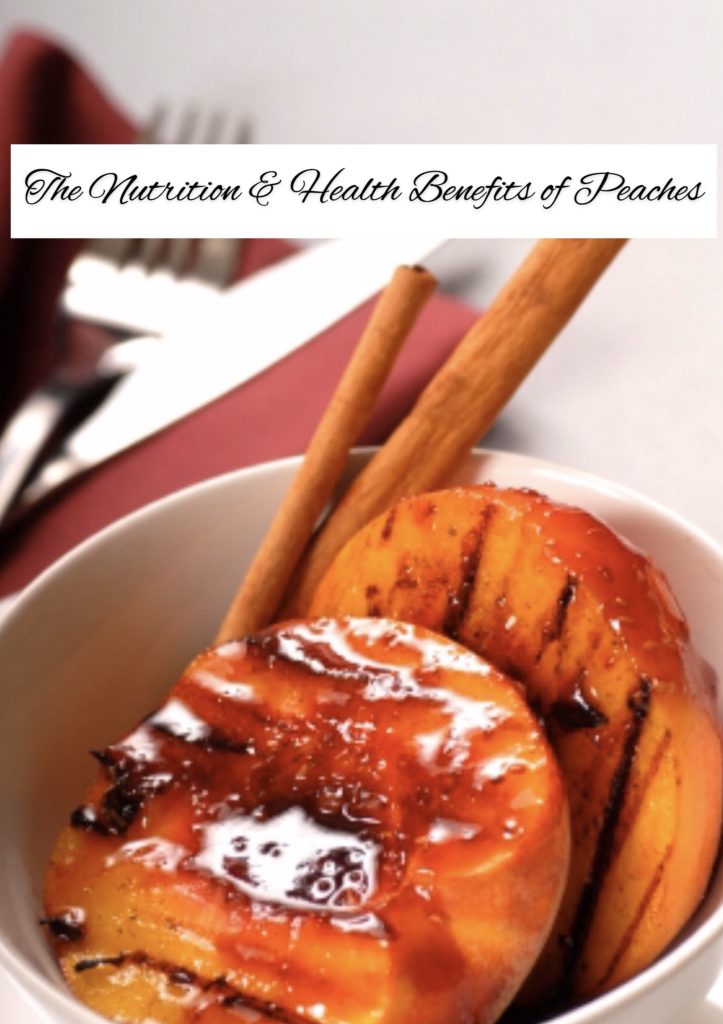Peaches might make you think of summer, but there are loads of ways to enjoy this fruit all year long. Learn the nutrition and health benefits, plus how to select, store and enjoy this juicy super fruit.

What comes to mind when you hear the word “peach”?
Is it, Georgia – The Peach State, or James and the Giant Peach? Or maybe the adjective “peachy” – which is used to describe something that is excellent – comes to mind. You might get a vision of a delicious, juicy summertime treat, or maybe it’s the color “peach.” Those are some of the responses I got when I posed the question on my Instagram.
But, what about the health benefits you get from eating a peach?
Although they’re not known for their nutritional benefits the way some other fruits are, peaches are nutritional powerhouses. In China, the fruit’s country of origin, the peach is a symbol of longevity.
The Longevity Fruit: Reasons for its Name
Skin and Eye Health
Peaches are a good source of vitamins C and A – two antioxidants known for fighting free radicals in our body. They also work their magic in specific areas. Vitamin C has been touted for its skin-care qualities, which is especially important during the summer months. Exposure to UV light creates free radicals, which vitamin C has the ability to help destroy. Vitamin C also plays a key role in forming collagen, a major protein in connective tissue (i.e., skin). Therefore, it may help reduce the amount of damage caused by UV exposure, and aid in the recovery of any damage created. Vitamin A plays an important role in eye health. Age-related macular degeneration, a major cause of vision loss, may be delayed by consuming adequate amounts of vitamin A.
Disease-Fighting Compounds
In addition to free radical-fighting antioxidants, peaches contain other beneficial active compounds. A study conducted by Texas ArgiLife Research, showed that the phenolic compounds in stone fruits, including peaches, may help to fight obesity-related diseases and have anti-inflammatory properties.
Weight Management
Peaches could be a sweet ally when trying to lose weight. Given their high water content (>80%), they are a low calorie food. A medium-sized peach contains fewer calories than an apple or pear of equal size. Peaches also provide fiber, which can help to keep you feeling fuller longer.
Nutritional Breakdown
Peaches are a great addition to any healthy eating plan. They are fat, cholesterol, and sodium-free. The chart below highlights a few nutrient quantities found in a fresh peach.

Fresh Peaches vs. Canned Peaches
Unfortunately, peach season only lasts a few months (June – August). So, what is a peach lover to do? Although not much compares to a fresh, juicy peach, the fruit can be purchased canned year-round. There are additional considerations when buying peaches in this form, though. They are often packed in their juice, light syrup, or heavy syrup. They are also packed in water, but that variety is harder to find. The more common options will provide additional calories.
Following are the calorie counts for 1 cup of each type, including the liquid.
- Juice Pack: 109 calories
- Light Syrup Pack: 136 calories
- Heavy Syrup Pack: 194 calories
Picking and Keeping the Perfect Peach
- Choose a peach that has a fuzzy skin (if you choose one with a smooth skin, you’re actually picking a nectarine. They are very similar, and can be used interchangeably in recipes).
- It should be firm, but give to gentle pressure.
- Yellow peaches will have a yellow-orange skin, with areas of red as they ripen. White peaches become whiter as they ripen.
- Keep unripe peaches in a paper bag at room temperature for 1 – 2 days. Once ripe, peaches can be kept in the refrigerator for 5 – 10 days.
- Wash the peach’s skin prior to eating it. If you choose to eat the peach without the skin, place it in boiling water for ~30 seconds, then transfer directly into ice water. This causes the skin to slip off.
Ways to Enjoy Peaches
- Grilled peaches can be used in both sweet and savory recipes. Slice them and lightly coat with non-stick spray. Grill them, and let their natural sugars do the work. Enjoy with a dollop of yogurt and cinnamon, or drizzled with balsamic vinegar.
- Chopped peaches make for a great salsa. Try this recipe from South Carolina’s Peach Council.
- Drink them! Blended, peeled peaches or peach nectar are great additions to fruit smoothies.
- Bake a cobbler. Use only peaches, or mix them with other fruits, such as blackberries, to make a delicious dessert.
- Add chopped peaches to a mixed greens salad, or a fruit salad.
- Slice or dice peaches and use them to top whole-wheat pancakes, waffles, hot or cold cereal, yogurt, or cottage cheese.
- Fresh – wash the skin, and take a bite!
Do you have a favorite way to eat peaches? Share with me in the comments below.



 Hi, I’m Heather – a registered dietitian, busy mom, consultant, adventure junkie and travel addict who has mastered living healthy on the go. My blog is where I share simple recipes and healthy living tips to help and inspire others to live their best life.
Hi, I’m Heather – a registered dietitian, busy mom, consultant, adventure junkie and travel addict who has mastered living healthy on the go. My blog is where I share simple recipes and healthy living tips to help and inspire others to live their best life.